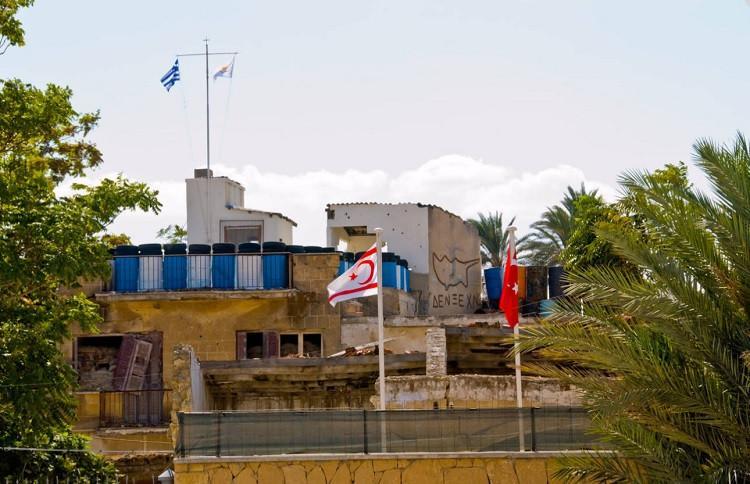Two-state formula is only solution in Cyprus: Professor
Hazal Özcan – ANKARA

Alamy Photo
As tensions continue to rise in the eastern Mediterranean over disputed energy resources, the island of Cyprus has been getting more and more significant each day.
With Turkish Cyprus in the north and Greek Cyprus in the south, the island is of strategic importance for both sides of the eastern Mediterranean dispute. The island’s complex history is another aspect of the arguments in the Mediterranean.
With the latest elections in Turkish Cyprus which resulted in the victory of nationalist Ersin Tatar, all eyes have now turned to a new round of possible negotiations for a solution on the island.
According to a scholar, a two-state formula is the only viable option for the island, and yet after this solution, a confederation might be considered.
“Today, new generations do not know this history of Cyprus. I will simply quote from Glafkos Clerides’ memoirs, ‘My deposition,’ where he reminds his readers that ‘there had been many occasions where he reached an agreement with Turkish Cypriot leader Rauf Denktaş but Makarios on the Greek Cypriot side always refused,’” Prof. Dr. Haluk Kabaalioğlu, a distinguished law professor, told Hürriyet Daily News.
According to Kabaalioğlu, the Greek side “played” with the Turkish side like “the cartoon Tom and Jerry.”
“They rejected all plans over the previous 50 years, including the Annan Plan, which was accepted by the Turkish Cypriots,” he said, adding that Turkey and the Turkish Cypriots made great efforts during the Crans Montana talks in 2017.
When asked about the possibility of a federation on the island, the professor said he thinks after 50 years of negotiations, the bi-communal and bi-zonal federation is “now dead.”
“Federal states are not represented in the EU Council, they have no voice whatsoever. Yes, they can be represented in the Committee of Regions, which has only consultative powers in three areas,” he added.
Emphasizing that the bi-communal federation idea is “dead,” the professor said, “In the end, it becomes clear that there remains only one solution and that is a two-state formula.”
“U.N. Security Council guidelines for a solution is no longer applicable after the EU membership of the Greek side,” Kabaalioğlu said.
Underlining that there is no “Cyprus nation,” but there exist two different nations on the island, Kabaalioğlu said that while some claimed that Germans were unified under a federal system, we cannot ignore the fact that both sides were of the same nation.
“Even after 30 years, they still have many difficulties. Cyprus is two different nations. There is no Cypriot nation. It is high time that responsible parties focus on a two-state solution,” he said.
He also added that the Greek Cypriot leader referred to this when the Crans Montana talks collapsed but afterward changed his stance again.
A cat and mouse game
“For 50 years, they have been playing a cat and mouse game with Turkish Cypriots and Turkey, refusing any formula to put forward, including the Annan Plan,” he said.
“Promises made to the Turkish side were forgotten after the referendum. For 50 years, they imposed trade embargoes on Turkish Cypriots - supposedly their compatriots - blockaded Turkish side, not allowing direct international flights, and even preventing international sporting events,” he said.
Kabaalioğlu also added that for 50 years, Turkey had provided support to the Turkish Cypriots, who were under “unjust and unfair embargoes.”
“According to some economists, Turkey’s support to Turkish Cypriots amounted more than $50 billion since 1963 collapse of the state,” he said.
Underlining that the “cat and mouse game” on the island is now over, Kabaalioğlu said it is time to get serious for a two-state solution.
“After a two-state solution, they may consider a confederation. The Turkish side joining the EU after Turkey becomes a full member. The current political system here is likely to improve in a few years, and we will return to normal conditions,” he said.
No solution in short term
Meanwhile, Prof. Dr. Mustafa Aydın told Hürriyet Daily News that he does not expect a solution in the short term.
“For nearly 40 years, negotiations were carried out but with Tatar’s election, it emerged that both the [Turkish Republic of Northern Cyprus] TRNC’s majority and Turkey moved away from this view. But regarding the international system, the [United Nations Security Council] UNSC and Greece are still in favor of this opinion,” Aydın said.
Aydın also said that Greek Cypriot leader Nicos Anastasiades has brought up the ideas of confederation and a federation in the last couple of years, but added that he has been attempting to strengthen himself in domestic politics.
“I don’t think that there will be a serious negotiation process in the short term. I think that there will be some unilateral steps Turkey and the TRNC will take. It is another matter of discussion whether this will bring a solution but maybe with Turkey’s step a new negotiation table might be set up,” he added.
He also said that Tatar’s position is in favor of both sides going their own way since negotiations have come to a deadlock and it is not “possible” and “reasonable” to move on with the quest for a federation.
“I think the essential impact of Tatar being elected will be on the forthcoming developments of the Cyprus problem. I presume that rather than negotiations, they will be in an effort to strengthen the TRNC and open the way for independence,” Aydın said.
“Maybe opening more of Maraş can happen but we need to wait and see this because at every step that will be taken, there will be a response from both the EU, the U.S. and the UNSC,” he added.
War in east Med has slim chance, but clashes may occur
Regarding the current situation in the eastern Mediterranean and a possible solution to the tensions, Aydın said that it all depends on the discovery of energy resources in the disputed areas.
“There is a past example to this. During 1970, Turkey and Greece were in a great competition in North Aegean and it was all about the discovery of energy resources. The discussions were moving from continental shelves and sovereignties, but the issue was energy resources,” he said.
When it was understood that there were no significant energy resources in the area, with a protocol Turkey and Greece agreed not to carry out unilateral acts to provoke each other, Aydın said.
“Thus, I think that a similar process will take place in the eastern Mediterranean if we cannot find the energy resources we expect to find,” he added.
However, if significant resources are found, both sides will want to extract it and at that point, they will either share the resources with negotiations or smaller clashes may occur, according to Aydın.
“I don’t think that a war will break out here. Because, it will be a war no one would permit. It is something that affects many countries,” he said.
“But it does not mean that there will not be any clashes,” he said, adding that accidents or conscious acts may take place.
“An atmosphere that is growing a little with smaller tensions. I don’t think that this will turn into a real war but if you ask there is such a risk; yes, there is if energy resources are found here,” Aydın underlined.
















